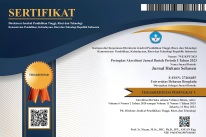Islamic Law Challenges To Carbon Market Development: A Case Study On Risk Management And Sharia Compliance
Abstract
Carbon markets have become a vital instrument in global efforts to address climate change. Nevertheless, the development of carbon markets is not without legal challenges, especially when considered from an Islamic Law perspective. This study proposes the application of an Islamic legal framework to identify and analyze the challenges that arise in the development of carbon markets. The main focus of this study is on risk management and sharia compliance in the context of carbon markets. Through in-depth case studies, this research explores potential conflicts between carbon market principles and sharia principles, especially related to transparency, speculation and profit distribution. Managing risks, such as those related to market volatility and uncertainty in the regulatory environment, is also an important aspect that requires a sharia-based approach. Additionally, this study explores efforts and strategies that can be adopted to ensure full compliance with sharia principles in the operationalization of carbon markets. This research uses a qualitative research method with an inductive approach that prioritizes data from previous studies.The results of this research provide in-depth insight into the complexity of the legal challenges faced in developing carbon markets from an Islamic Law perspective. Practical implications and policy recommendations are outlined to guide stakeholders in designing and managing carbon markets by considering sharia values and principles. Thus, this research makes a significant contribution to the Islamic legal literature and enriches our understanding of the integration of Islamic principles in the development of global carbon markets
Downloads
Copyright (c) 2024 Nisa Uljanah

This work is licensed under a Creative Commons Attribution-ShareAlike 4.0 International License.






